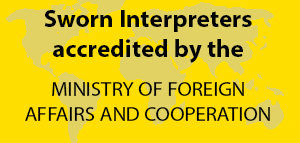We translate a lot of different types of qualifications here at CBlingua from many different countries and for many different reasons. Most people that need to translate their degrees and other qualifications do so because they need to get it recognized in a different country in order to get a job or to study.
Generally, translating these diplomas and certificates or even academic transcripts isn’t very complicated. If the client’s in a rush, translations can often be fast-tracked to give the client the translation he or she may need asap. However, most of these qualifications have to be translated by a sworn or certified translator (a “traductor Jurado” as they are called in Spain).
The sworn translators
Can be hard to find sometimes, especially if the document is in a rare language. Often, the translation must be done by a Spanish sworn translator. Translations made by sworn translators from other countries are sometimes accepted by the Spanish authorities, but I have seen clients who have had to come to us here at CBlingua Malaga after their translation (made by a translator certified in another country) had been rejected by the Spanish authorities. This means that getting your school transcript or your university degree certificate translated by a Spanish translator is the only surefire way of making sure that your translation is accepted here in Spain.

One request we sometimes get when translating these types of documents is that we translate the name of a qualification or class in a certain way or even give them a certain grade. However, we obviously can’t just translate something that isn’t true. We have sometimes had clients who wanted us to give them a higher grade or to give them a higher level of studies than the one they actually have. This can obviously not be done. However, on some occasions sworn translators can be flexible.
When the client has a suggestion on how to translate the name of a degree or a class and this translation, while maybe not being the one that the translator would have chosen, is still a correct translation, some translators may be willing to translate it as asked. As far as grades, most translators would be unwilling to translate, for instance, numerical grades into letter grades, however, most translators would be willing to put a footnote explaining the grading system or even comparing them.
So, to sum up, if you need a certified translation for official reasons in Spain, better to get a Spanish sworn translator to make sure that said translation will be accepted and, if you have a question or would like something to be done in a certain way, it never hurts to ask 😉
I hope you have found this article interesting and maybe it has helped you to better understand what is needed when translating these types of documents. Here at the CBlingua Malaga translation agency we like to keep people informed and that’s why we publish articles regularly on different translation and sworn translation related topics. Keep browsing this website or any of our other websites to know more.
If you need to have a sworn or certified translation, or even just a standard translation, done or you have any queries, please write to us at info@cblingua.com
